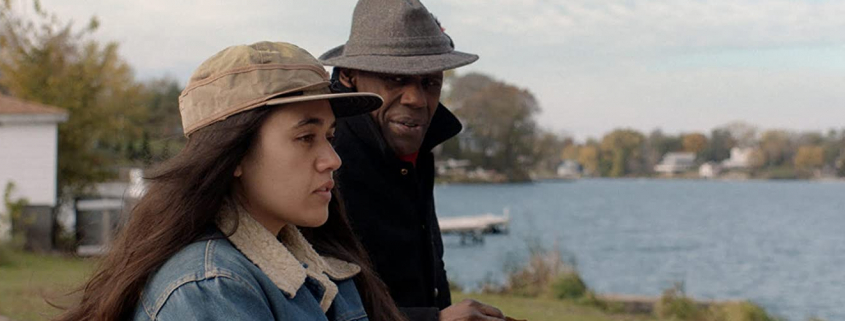Live screening hosted for upcoming release ‘Once Upon a River’

USC students and faculty gathered Monday for a live virtual screening of the ten-time award-winning film “Once Upon a River,” a coming-of-age story based on the 2011 novel of the same title by author Bonnie Jo Campbell. The screening was followed by a live Q&A session with screenwriter and director Haroula Rose and actress Kenadi DelaCerna, all hosted by the School of Cinematic Arts. The film depicts the life of main character Margo Crane (Kenadi DelaCerna) as she navigates tragedy and growing up in 1970s rural Michigan.
After being sexually assaulted and having to face the death of her father, Margo decides to leave her hometown and travel down the Stark River to track down her estranged mother (Lindsay Pulsipher). Along the way, she meets several people, such as an elderly man (John Ashton) who she befriends and gains a familial relationship with. In her journey, she learns about many human concepts, including love and death, and faces the guilt and inner turmoil that stemmed from her father’s passing and mother’s leaving.
“Adapting a novel, I keep saying, is really deceptively difficult because there’s so much in there that you love that you have to let go of, but ultimately it’s to serve this larger story that’s a new thing. It is what it was and now it’s also its own thing,” Rose said. “[Campbell] was always supportive of that too, her analogy is ‘I gave birth to this thing and raised it, but now you’re marrying it, good luck.’”
Notably, this is the directorial debut for Rose, who decided to direct and produce “Once Upon a River” after having read the novel by Campbell. Rose said she felt so compelled by this story that she contacted Campbell personally and talked about the story with her. After that, Campbell allowed Rose the rights to produce the film and from there, “Once Upon a River” debuted on May 10, 2019 to film audiences across the country. The movie has earned 10 awards and 15 nominations from various film festivals.
“I just remember we were almost just totally in sync the way we were talking about how the characters should be portrayed, and so it was really amazing that she trusted me to tell this story,” Rose said. “I know she had other offers that … well, I know they had more money and stuff, but I think she trusted this approach better, and so I’m really grateful for that.”
Going alongside Rose’s directorial debut is DelaCerna’s film acting debut as Margo. DelaCerna studied acting and theater for film and television at Douglas Anderson School of Arts as well as The New York Conservatory for Dramatic Arts. Currently, she is continuing her studies at Michael Warner Studios.
“I couldn’t ask for anything better to have this as my first film to work on with such an amazing director, Haroula,” DelaCerna said. “It’s been a journey that I never thought I would have embarked on. We just had such an adventure, and we’re still having an adventure to this day.”
The film takes on a variety of different messages as it shares Margo’s complex and constantly changing situation. Many of the themes center around the way in which Margo experiences and is received by the world around her, particularly because she identifies as a Native American woman.
“For me [Margo not knowing which tribe she is a part of] is so powerful because I see a lot of Native youth today that struggle to find connections with their culture because of legacies of colonialism,” Q&A moderator, composer and Indigenous advocate Kapena Batista said. “But what’s really interesting, in this kind of weird way, is that I think Margo is probably the most Native woman I’ve ever seen on film.”
A message of empowerment is also clear within the film. Rose sought to convey that the choices of the women within the film were, although painful to make, valid. The audience witnesses this as Margo must choose between living the more white-washed, suburban lifestyle with her estranged mother or returning to the home she created with her father figure, Smoke.
“I do think this film is about how you still have control over your life, and you can be that empowered woman that you see other people being, and that’s a big thing that I get from this story,” DelaCerna said. “Life moves on, like the river does. That’s kind of how I see it, and you can continue going, continue flowing through life and changing.”
Another significant detail of the film is how Margo is presented as a character of color. The novel hinted at Margo being Native American, so in the adaptation, Rose decided to lean into this description. Although she is clearly shown to be Native American in the film, Rose also made a point of not concentrating Margo’s character too heavily on this identity so she can properly represent Native American women as people with human experiences.
“In terms of telling a story about Indigenous people, I really wanted to have the right partners, so I would seek out this casting director and one of my executive producers and talk to a lot of people just to make sure, [I] have other eyes on it,” Rose said. “But at the end of the day, it feels like once you’re telling something that is an authentic, human story, it resonates everywhere … the idea that yes, she’s Native, but also, it’s not about that.”
This film was impactful for many in how it told such a complex and tragic yet hopeful story that anyone could relate to in some way.
“It was this fantastic journey and story of so many people, and I’m just still overwhelmed seeing it again for a second time,” Batista said. “I wanted to thank you two for creating such a beautiful piece of art.”

